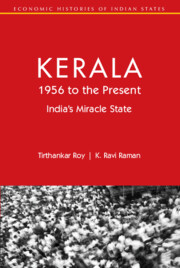Book contents
5 - Work, Labour and Migration
Published online by Cambridge University Press: 31 May 2024
Summary
While advances in mass health and schooling made Kerala quite distinct from other states in India in the 1950s, this was not a pathway to economic and social mobility, let alone economic growth. The quality of education, especially higher education, was poor. The persistence of gender norms kept many women out of the labour force, and high unemployment forced most skilled people out of the state. Outside the state, Malayalis found work, but in jobs that did not provide a dramatic change in conditions compared with similar jobs back home.
The Persian Gulf migration broke the stagnation, not just by offering more gainful opportunities but in indirect, if powerful, ways. In the long run, the job market in the Gulf demanded progressively greater skills from the migrants. Two periodic reports – India Migration Reports and Kerala Migration Surveys – reveal a trend towards rising skill levels on average, consistent with the diversification of the Gulf economies from oil-based occupations towards financial and business services. Consequently, more jobs opened up in offices in clerical, accounting, sales and supervisory roles. The migration offered those who stayed back in Kerala the scope to invest in human capital. It stimulated growth by increasing construction activity and the consumption of services. It also possibly encouraged business investment, but this link remains under-researched (Chapter 4). A third factor that deserves mention is women's changing roles and economic conditions, both those who stayed back and those who moved out. In both cases, the nature of the migration and mobility link was different from men’s.
The recent globalisation, or re-integration with the world economy, is, in these ways, a story of labour – and not primarily trade, foreign capital inflow, or investments abroad. It would still be a mistake to overstress international migration or even, more narrowly, emigration to the Persian Gulf. The recent history of labour is also a history of occupational diversification, professionalisation, skill accumulation, shifting gender roles, consumption and saving, and demographic transition.
The present chapter tells that story.
- Type
- Chapter
- Information
- Kerala, 1956 to the PresentIndia's Miracle State, pp. 82 - 98Publisher: Cambridge University PressPrint publication year: 2024



